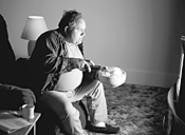
The volcano inside Lawrence Smith's chest erupted on June 8, 1999. The LTV shipping supervisor crumpled to the plant's floor, dead of a heart attack. But as abruptly as his life ended, it's surprising he lived to age 54.
At 6 feet 2 and 260 pounds, the beefy Smith treated his body less like a temple than a tool shed. He'd hit the bad-health trifecta: too much smoking, too little exercise, and a poor diet, the last triggering high cholesterol and diabetes. He'd felt stressed since becoming supervisor, a job he got after the previous foreman suffered a heart attack a year earlier.
Smith visited Dr. Franklin Price almost two dozen times in the five years preceding his death. In between badgering his patient to swap the cigs for a salad fork, Price guided his treatment for prostate cancer. The doctor ran regular cholesterol tests and six EKGs to gauge Smith's cardiac health. Price's records also suggest he told Smith to see a cardiologist two months before he collapsed.
Last August, Smith's widow asked a Cuyahoga County jury to decide who to fault for the seizure -- her husband or his doctor. Maggie Smith brought a wrongful-death suit against Price in common pleas court, where her lawyers argued that he missed billboard-sized warning signs of heart disease. They asserted that even if he had made the cardiologist referral -- documents were hazy on the matter -- it should have come years earlier, after Lawrence Smith's first heart test in 1994. Price's attorneys countered that the physician did everything to help a man who did next to nothing to help himself.
Jurors blamed Price. On a 6-2 vote, they awarded Maggie Smith and the couple's two adult children $3.5 million; a judge later added $1.2 million in prejudgment interest.
In a written summary, the jury claimed that Price failed to provide "ordinary, reasonable care." Yet insofar as Lawrence Smith preferred french fries to Fitworks, it's fair to ask if the same charge should have applied to him.
"A doctor can advise and give counsel to a patient," says Dr. Kevin Geraci, president of the Northern Ohio Medical Association's Cleveland branch. "But it's still up to the individual to do what he has to do. We can't guarantee immortality."
A similar sentiment ripples beneath the larger, louder debate over capping jury awards in malpractice cases. Physicians, lawyers, insurers, juries -- all absorb criticism for the rising cost of medical premiums, a surge that has provoked the cry for tort reform. Meanwhile, patients remain generally blind to their own culpability in the crisis. They act as if bad habits are a birthright, doctors say, convinced that science will find a way to clean up the Superfund sites their bodies have become. When the damage can't be undone, they or their survivors sue -- and unwittingly make the case for tort reform easier to sell.
"People have this belief that they can do harm to themselves for years and years, then walk into a doctor's office and say, 'All right -- fix me,'" says David Prok, a Baldwin-Wallace sociology professor. "They're looking for someone else to take responsibility for themselves."
A federal judge in New York rebuffed such blame-throwing last month, when he tossed out a suit brought by parents who alleged McDonald's high-fat grub caused their children's obesity. The case typifies how adults cop an adolescent "It's not my fault" attitude toward health, Walter Olson says. Author of the legal tomes The Litigation Explosion and The Excuse Factory, he runs OverLawyered.com, a website that scrutinizes the justice system.
"What you have are patients who are more and more passive . . . in worrying about their health. But if someone's at risk for heart disease, then part of meeting your doctor halfway is just deciding on your own to go to a cardiologist."
The Smith case hinged on whether Price, an internist with two Cleveland offices, should have sent Smith to a heart specialist. The plaintiff's lone expert, Dr. Stephen Glasser, testified that an early referral was needed and could have kept Smith on this side of the grass.
A physician at the University of Minnesota, Glasser declines to talk about the suit. But he says too many doctors offer only the bluntest of advice to patients: "You're overweight -- lose weight." When that fails, he adds, "Physicians give up."
Ralph Hale, one of six jurors who voted for the verdict, suspects that happened to Smith. "He was going to the doctor regularly, he did everything he could. The doctor obviously missed something."
Price declined comment. Maggie Smith, who lives in the University Heights home she shared with her husband, did not respond to interview requests. One of her lawyers, Peter Weinberger, disputes that Lawrence Smith -- whose family claimed he tried to improve his diet, quit smoking, and exercise -- cheated his health. "He wanted to modify his lifestyle, but there's a large percentage of the population that can't do that. That's why we have medication."
Price, who rejected a $1 million settlement demand before trial, hurt his own cause in court, turning petulant under cross-examination. Weinberger says jurors sniffed out the truth behind the doctor's testiness -- and handed Smith's family what they deserved.
"Juries have a real good sense of what's right and wrong in malpractice cases," the lawyer says. "We have pro athletes who make millions of dollars. Giving $3.5 million to a hard-working family man who has two kids and a wife didn't seem like a lot to the jury. I agree."
Three doctors who testified on Price's behalf defended his reading of the EKGs, however, saying the slight aberrations shown were not enough to trip storm sirens. They maintained that Smith, by heeding Price's admonitions to lose the smokes and the spare tire, could have delayed his trip underground.
Whether that's true remains impossible to know. Yet even Glasser admits people place so much faith in medical advances, they see no reason to slide off the bar stool and hop onto the StairMaster. "Patients are more willing to go under the knife and have their chests splayed open than to change their behavior."
Nor can doctors write a prescription for common sense, says Akron lawyer Michael Hudak, who represented Price at trial. "Getting someone to lose weight, exercise more, stop smoking -- that's beyond the control of the physician. Any physician."
The jury's two dissenting members believe Smith's vices claimed his life -- along with Price's reputation. One of them, Morris Blatt, wrote to defense lawyers, alleging that the other six jurors let their emotions obscure the evidence and that Smith "abused himself."
A judge denied Price's request to include the note in his pending appeal. But malpractice attorneys say it's the first time they can recall a juror attempting to enter written frustrations into the court record. Allyson Cooley, who sided with Blatt, says she was tempted to follow suit. "[Smith] didn't try to change. He didn't fix his diet, he didn't exercise, he started smoking again. But the widow was looking to place blame, and Dr. Price was the closest one."
In his closing argument, John Martin, Weinberger's co-counsel, suggested Smith bore no liability for his death: "It's absurd for anybody to come into this courtroom and say, Lawrence Smith would be alive today if he stopped smoking, if he had lost weight . . . The doctor let him down."
Following a week-long trial, the Smith jury took only two hours to deliver a verdict on a Friday afternoon. Blatt and Cooley contend other jurors rushed the decision to avoid returning to the courthouse on Monday. "Their whole thing was 'Let's get out of here,'" Cooley recalls, adding that none bothered to so much as scan the case's numerous exhibits. "They just said, 'Her husband's gone, give her the money.'"
Not so, Hale says. He insists deliberations were brief for the simple reason that "there wasn't much to talk about -- a man died." But while judges instruct juries to think of a courtroom as a no-pity zone, sympathy can swallow logic in malpractice cases, Olson says. "The experts from each side generally end up canceling each other out, so the jury thinks, 'Well, here we have someone who's lost a loved one. Let's award her a judgment.'"
Adds defense lawyer Hudak: "The amount of time this jury took indicates to me they were influenced by passion more than facts."
The Smith verdict represented one of a handful of malpractice awards that topped $1 million in Ohio last year. State and national figures reveal that, for all the headlines about "runaway" jury verdicts, judgments have plateaued, while doctors win about 70 percent of cases. Yet last month, Governor Bob Taft signed a tort-reform law that caps non-economic damages at $350,000 in most medical injury suits.
The legislation chafes Cleveland lawyer Don Iler. He helped sink the state's last tort-reform push four years ago, successfully arguing before the Ohio Supreme Court that a sweeping 1997 measure was unconstitutional. He says the latest initiative treats juries like children, and he cautions against viewing the Smith verdict as an episode of When Jurors Go Bad.
"You could see it as a jury that went haywire, that wanted to go home and watch Law & Order. Or you could see it as a jury that listened attentively to the attorneys and the testimony, and had made up their minds by the time they went in to deliberate."
Senator Eric Fingerhut offers a similar take. The Cleveland Democrat has drafted three bills to rein in medical insurers, whom he regards as the black hats in the tort-reform standoff. Capping how much juries can award, he says, represents the worst kind of elitism.
"For all the times juries find in favor of doctors, I trust them in the much smaller number of cases where they find for plaintiffs."
It's a valid point -- except that, as Lawrence Smith might agree, winning a verdict means a lot less when you're already in a casket.












